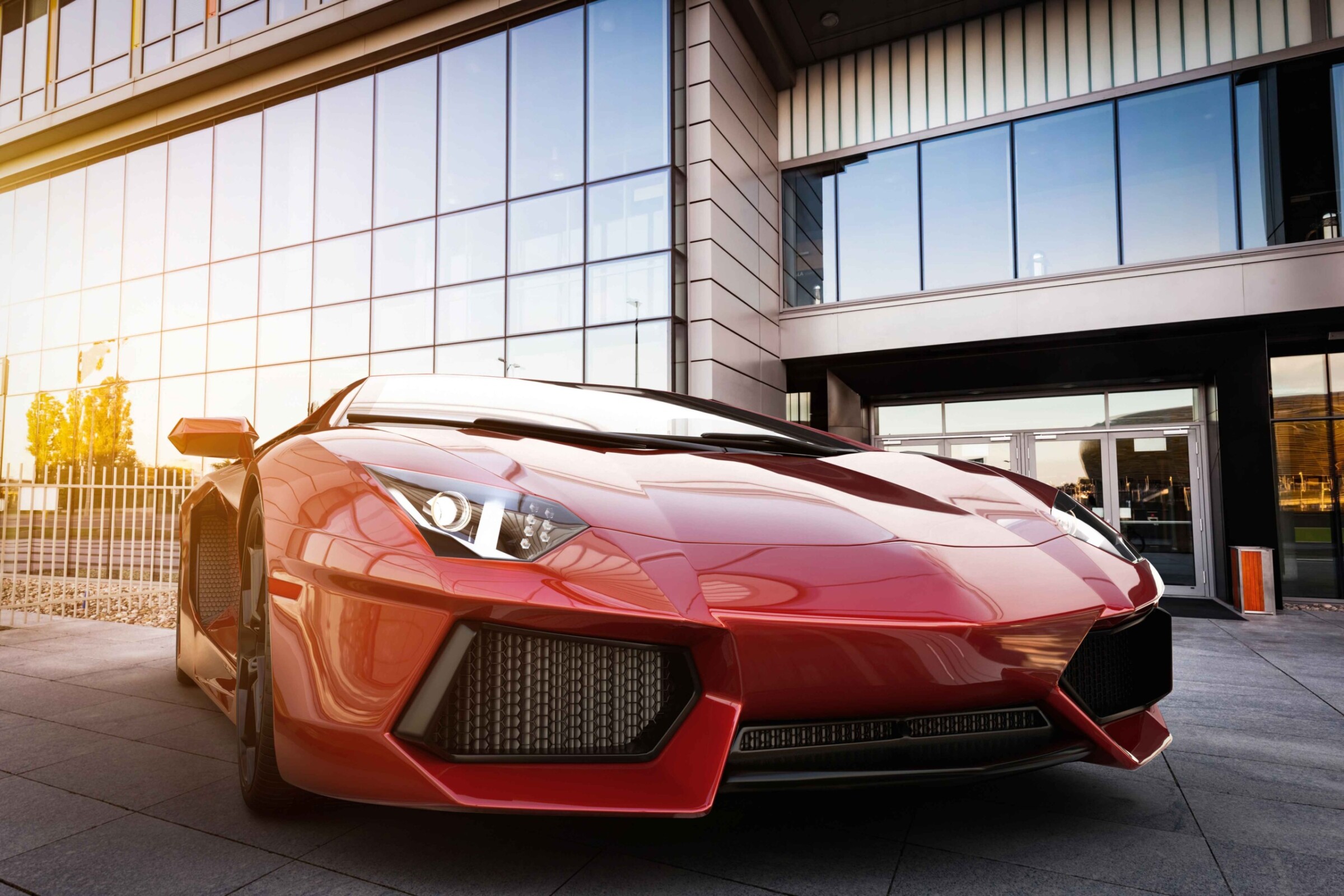
Until not so long ago, aluminium in the automotive sector was reserved for the top end of the market or certain engine components. Today, the material is put to much broader use. And this means millions of parts that have to be deburred. To this end special and often complex deburring tools are required, and their punches and dies usually have to be wire-eroded. This is where Mitsubishi Electric plays a particularly helpful role.

Making a name for itself with complex solutions.
Covers, engine housings, brackets and other engine components: the aluminium and magnesium components, among other things for the automotive industry, are produced by high-pressure die casting with a cycle time of roughly 30 seconds. After this, robots handle the deburring and fine cleaning steps. Until the end of the Nineties, these operations were performed manually, with a cycle time of 3 to 4 minutes – too long for the pace of today’s production, not to mention the strong variations in the results, depending on person and workload in an unhealthy environment. Even the use of robots has not radically reduced the time taken, as the process is still sequential and hence slow. For this reason, special deburring tools have been developed that precisely replicate the geometry of the various components. As a result, the workpiece is picked up at outlet and all the fine work performed in one go at the end of the line. In this way, risers and runners are eliminated and the parting lines and existing holes and eyelets are immaculately finished. These operations call for the use of mobile devices such as hydraulic tool carriers, saw carriages, drilling equipment and even thread cutters.
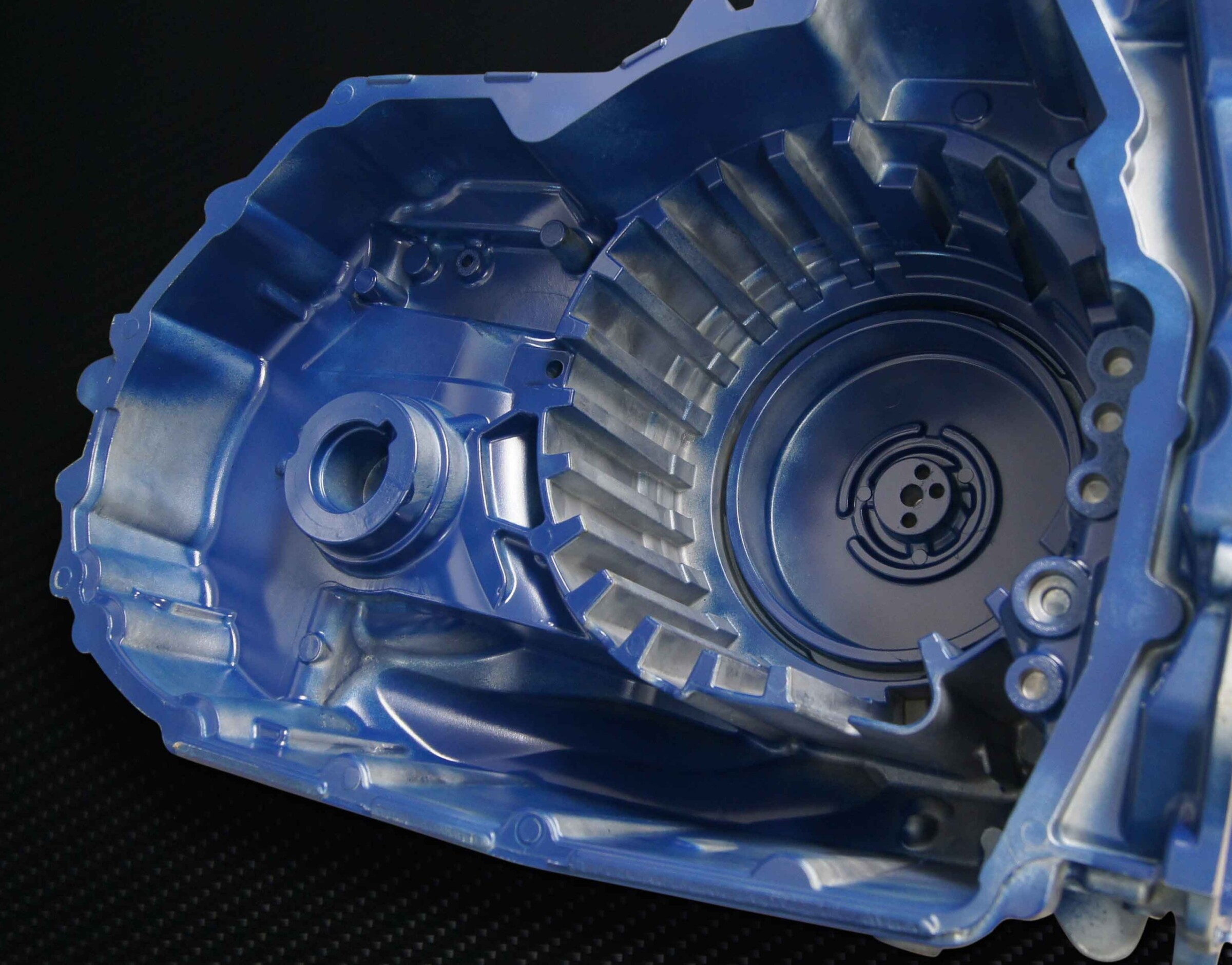
Example of a fairly complex and extensive aluminium part, deburred and cleaned with a tool from the company in Cantù
Wire-cutting punches and dies for complex deburring tools
The design and manufacture of these often elaborate and complex tools is today the core competence of Farina Marco, which has its headquarters in Cantù in the Italian Province of Como. The company founded in 1974 started out by making progressive composite and deep-drawing tools. This line of business was pursued for several decades, although the market changed enormously over the years. The firm in Lombardy responded quickly to the changing needs and has focused on deburring tools. In doing so, it has specialised increasingly in the design and production of truly high-tech machine tools.
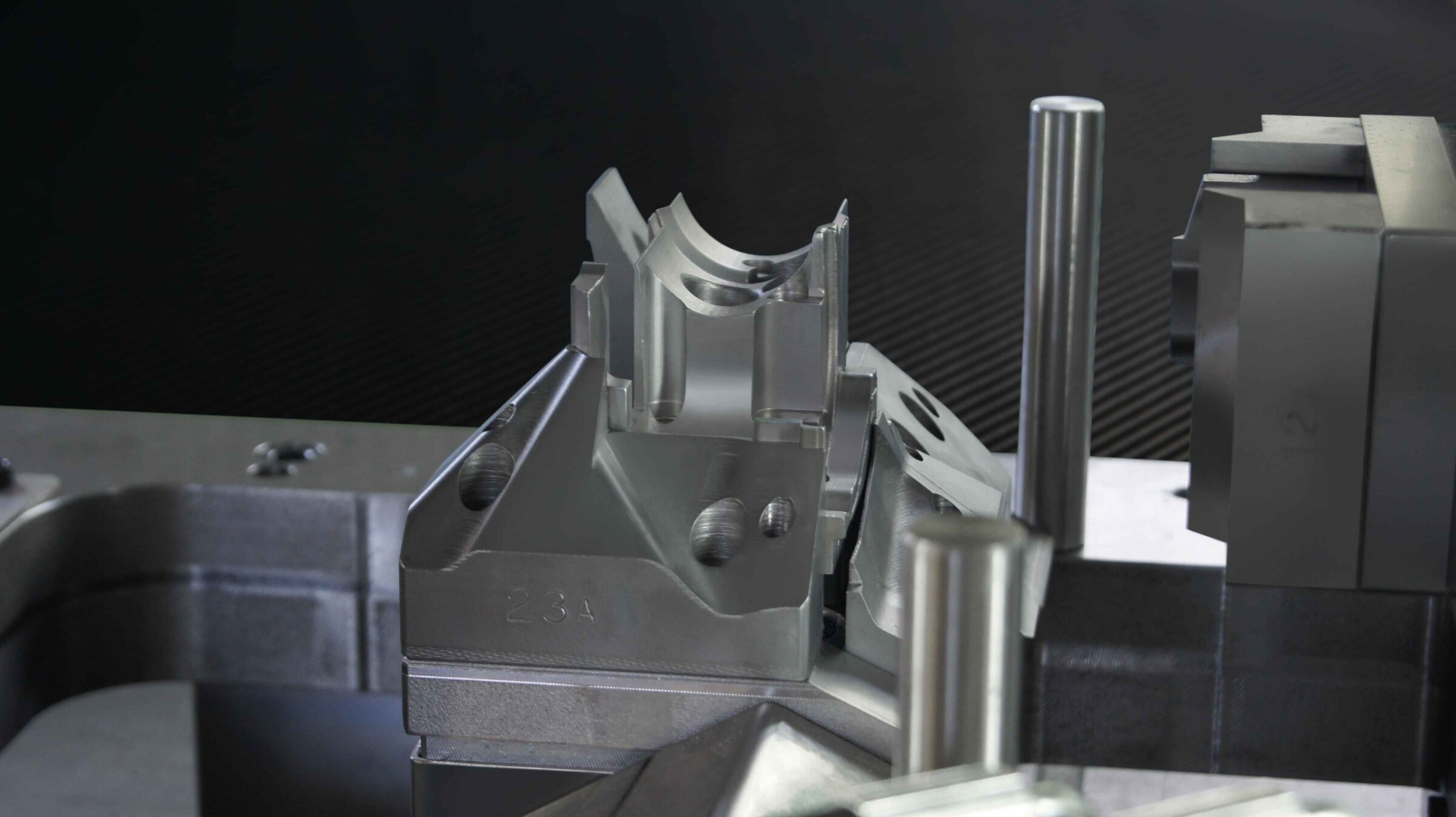
Detail of a punch on a tool largely machined with the Mitsubishi Electric MV2400S
Today, the company is noted for the high quality of its products and its competitive, punctual and adapted service. Always searching for innovative solutions capable of boosting tool performance, the business has set itself the goal of eliminating all manual operations.
Design and production of elaborate and complex tools
The company mainly serves foreign customers, Sales Manager Cristian Farina confirms: “We work for the household appliance and furnishing sector, although the automotive industry remains our core business sector. We have many customers in the UK, Spain, France, Germany, Austria and Eastern Europe. Normally we produce prototypes, but sometimes we build two or three identical models. Nowadays, car makers upgrade their product ranges much more frequently, and each year they introduce new components that used to be made of sheet metal or didn’t exist at all. The advance of the electric car, for example, has brought with it a whole series of housings and devices made of aluminium that were previously unknown.”
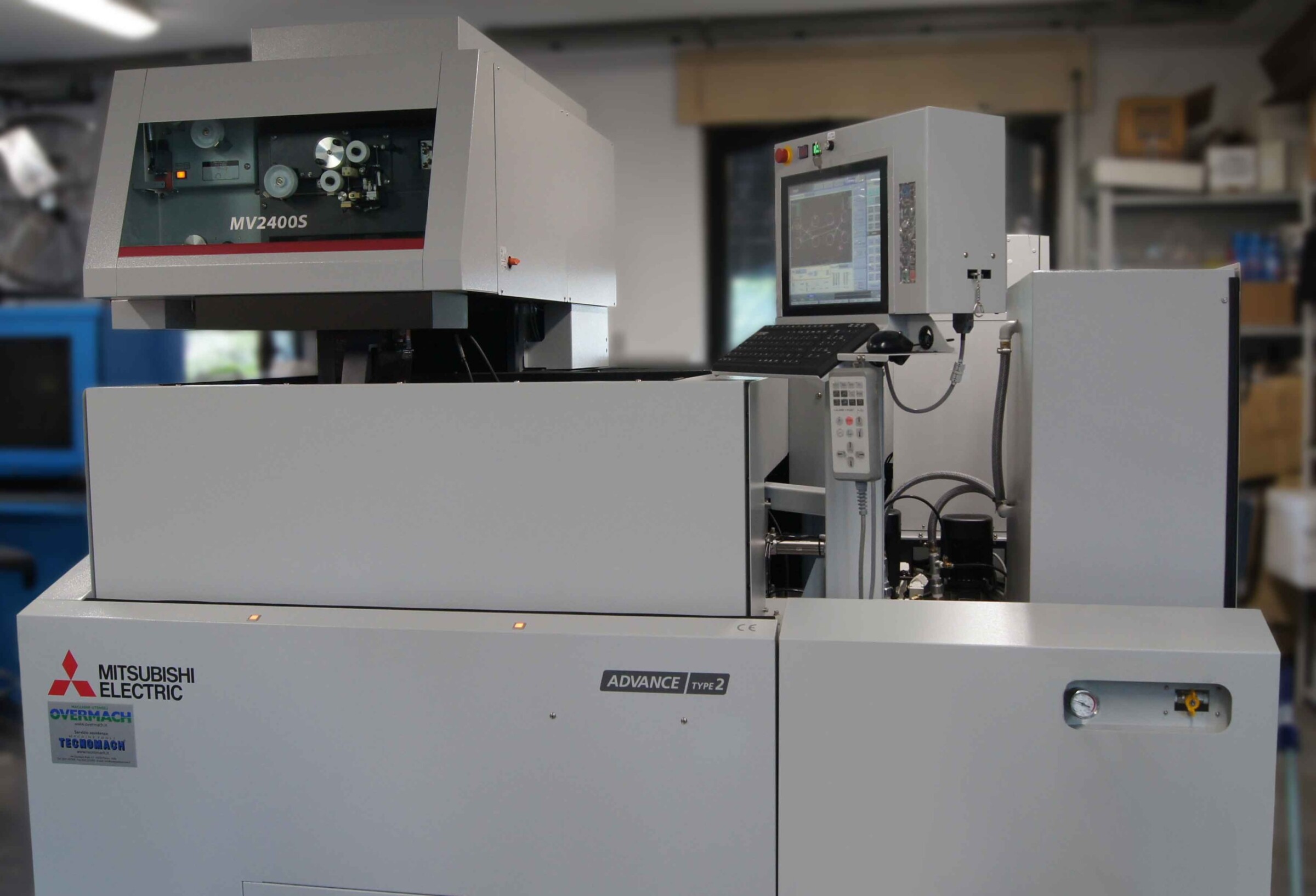
In the Farina Marco workshop, the Mitsubishi Electric MV2400S is used for the production of punches and dies for deburring tools.
The company’s quality conforms to ISO 9001:2000 and the highly skilled workforce has at its disposal a latest-generation machine park that includes machining centres, CNC lathes and wire-cut EDM systems. The last-mentioned technology is used particularly for the construction and final machining of punches and dies, as the most recent installation of a Mitsubishi Electric MV2400S shows. This machine achieves outstanding surface quality coupled with superlative machining precision and makes use of an innovative and high-performance communication system (CNC control drive) using exclusively fibre optics for real-time communication among all units.
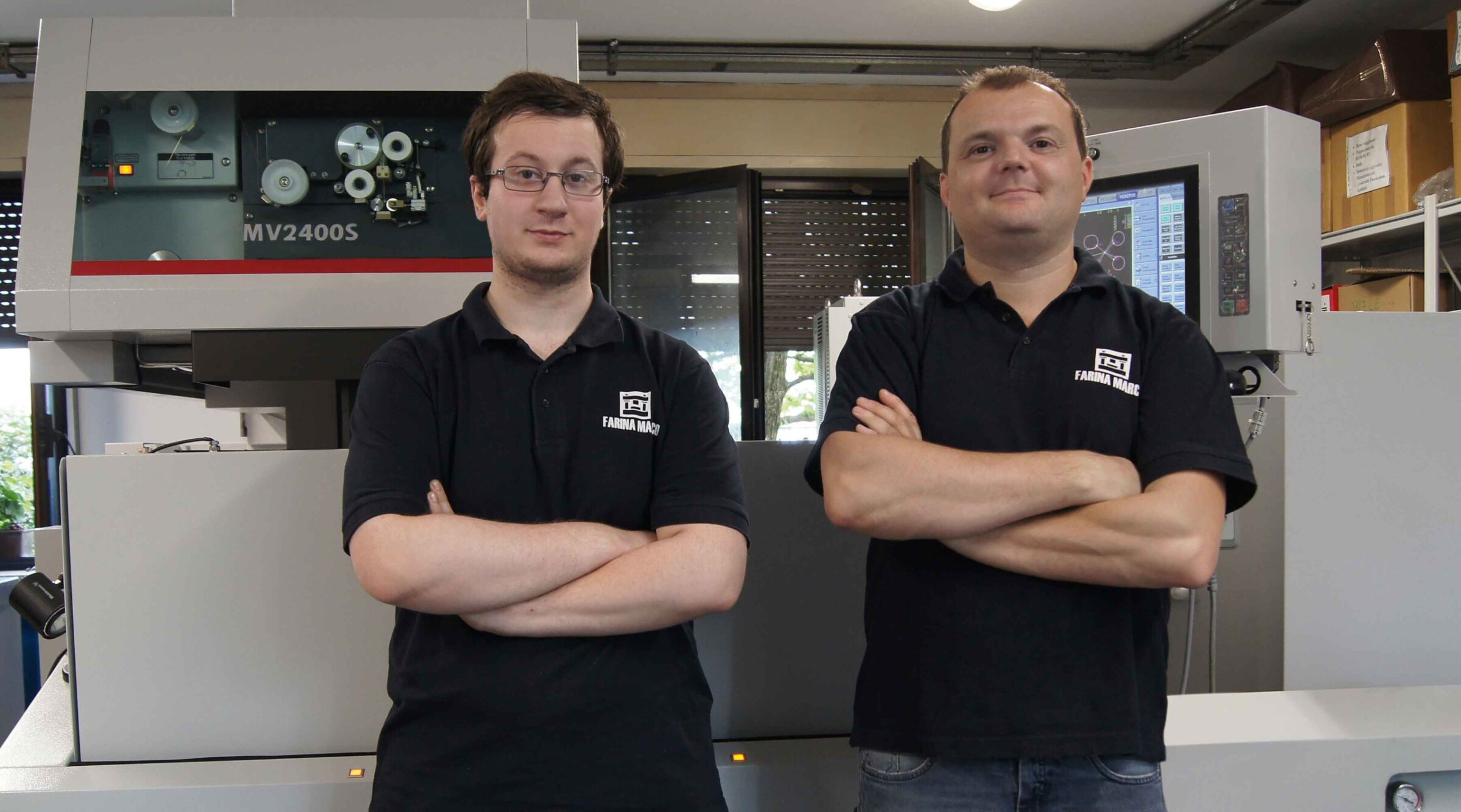
Cristian Farina, Sales Manager of the business in Cantù, (right) and Luca Somaschini (left)
The machine is available in “S” and “R” versions: the first makes it possible to economise on the purchase price, while the second is more lavishly equipped. Farina Marco has chosen the more competitively priced model, impressed by its price/performance ratio. “The better-equipped version would have been a size too big for us and our practical experience has confirmed this. We also checked the offers of rival manufacturers and, after a direct comparison of products in the same category, we can confirm that the MV2400S stands out with its superior performance in terms of speed, precision and other useful functions. What ultimately clinched the decision was the machine’s availability from the supplier Overmach – the machine was in our shop in only three days. As a side-line, this has enabled us to solve numerous problems caused by an increase in workload. In addition to the advantage of a broad selection of machines at its branch, Overmach eliminated all the red tape in supplying the machine. It’s true that we already knew each other, but they placed so much trust in us, and we really appreciated it.”
Overmach Group with its headquarters in in Parma, Italy, offers the metalworking sector a broad array of lines and machine tools from big-name international manufacturers, intended for toolmaking as well as for general mechanical engineering.
The Mitsubishi Electric MV2400S features simple and intuitive operation. The installed CAM system is conspicuous with its progressive user interface and is capable of directly importing and managing 3D data without supervision. Because of the exceptional complexity of the equipment it builds, Farina Marco nevertheless uses an external CAM system. The use of Tubular Shaft Motors instead of rotary motors and the lack of friction facilitate extraordinary sensitivity. “We have found the machine to display excellent precision both during machining and with its stop function. In the event of the tiniest resistance, the machine comes to a halt so as to protect the workpiece and the machine itself from harm. Also worth mentioning is the high speed of the rapid motions: even if we only gain ten minutes per day, the time savings in the course of a year can really add up.”
Outstanding precision with the machining and stop function
Major progress has also been made with the automatic threader. Up to a height of 180 mm the Intelligent AT system is capable of rethreading straight into the kerf at the point of wire breakage. It facilitates not only optimisation of thread recovery but also better performance in the annealing and straightening of the wire. “We are aware that other machine manufacturers offer similar systems, but Mitsubishi Electric technology is truly fast and effective. The automatic water level control in the tank is also very important for us, because this way we can set up several workpieces at the same time, all with different heights, without the water level having to be constantly re-adjusted for each one. This means that each workpiece has the optimum parameters, and the much extended machine autonomy enables us to run unmanned shifts at night and on public holidays with a considerable boost to productivity.” The technicians at Farina Marco have also been impressed by the machine’s autonomous filter configuration: the Long Life System integrated in the machines has extended its service life yet again – with the associated reduction in outlay on replacement parts. Power consumption and wire usage have also gone down.
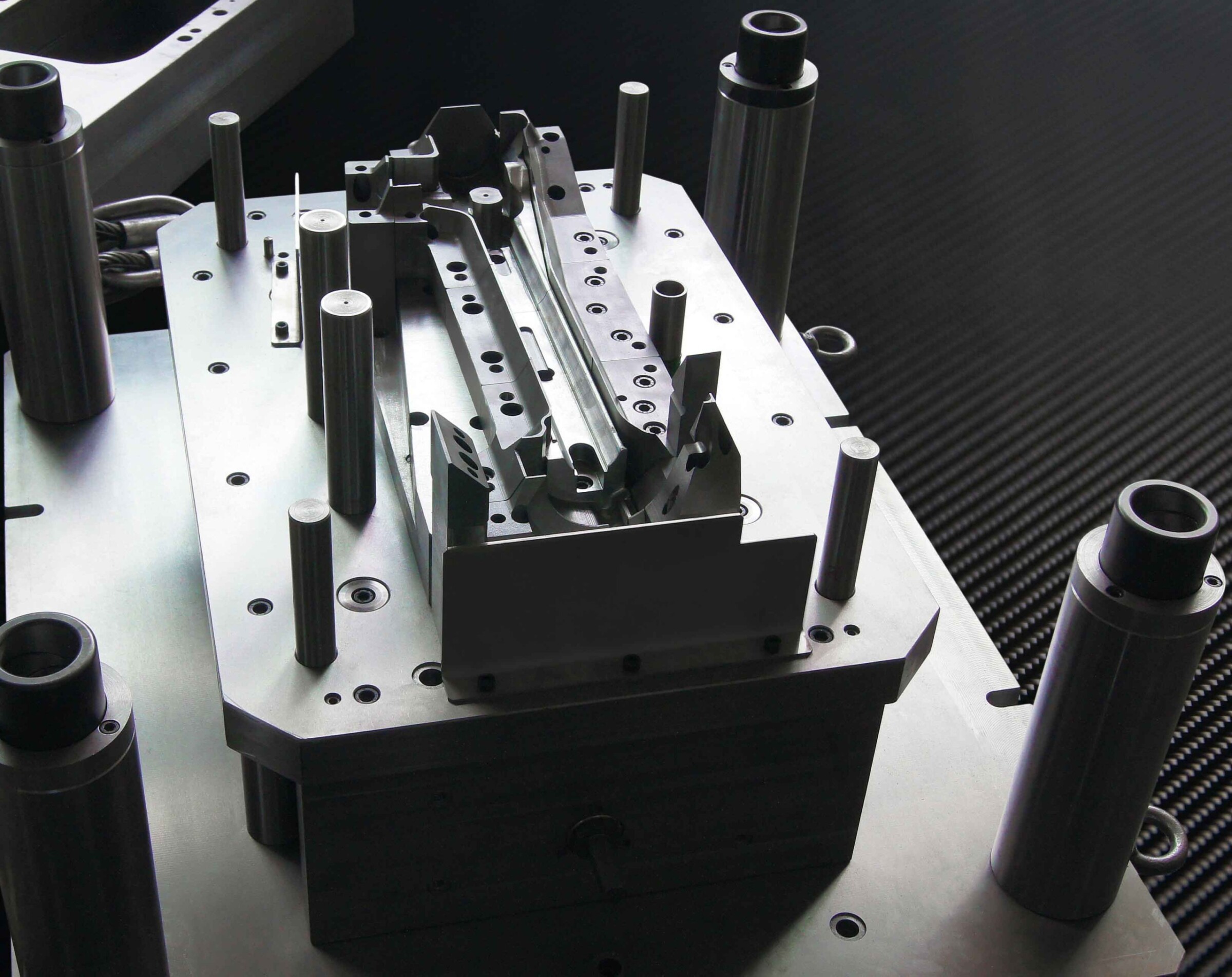
Mitsubishi Electric technology is truly fast and effective.
Today it is becoming more and more essential to specialise in complex processes – and this applies all the more to the many small businesses in Italy. Many of them are not only taking up the challenge, but are also seeking to “speak with their own voice” and appeal to customers with their own special skills that are appreciated on the international market. The experience of Farina Marco is an example of this: “We build highly complex and elaborate tools that not everyone is capable of designing and making. In addition, there is no end to innovation. Today, for example, we are noting an increasing use of magnesium, a metal with incredible properties, but which calls for special attention during punching. Barrel-polishing is out of the question, and so we have had to come up with other solutions. We supply our tools in all cases fully equipped with electrical, hydraulic and pneumatic connection points, fully wired and ready to be set up next to the press that it’s supposed to communicate with.”
Mitsubishi Electric technology is truly fast and effective.
The business in Lombardy carries out both sampling and fine-tuning in its own workshop, although, if the customer needs assistance with commissioning, Farina Marco also offers an on-site set-up service. Even if the deburring tool segment really is a niche market, the company is experiencing a major expansion of business both in terms of its customer base and the number of systems in the pipeline and already under construction. Farina Marco’s sales have been constantly rising for years and the possibility of extending the workshop is already on the horizon.
Name and place of company:
Farina Marco
Founding year:
1974
Number of employees:
25
Core business:
Production of tools for the deburring of high-pressuring casting dies for aluminium and magnesium
Fields marked with a * are mandatory.
Mitsubishi Electric Europe B.V.
German Branch
Mitsubishi-Electric-Platz 1
D - 40882 Ratingen
Sales
Tel.: +49 (0)2102 / 486 - 6120
edm.sales@meg.mee.com
Service
Tel.: +49 (0)2102 / 486 - 7600
edm.hotline@meg.mee.com
Applications
Tel.: +49 (0)2102 / 486 - 7700
edm.applikation@meg.mee.com
Spareparts
Tel.: +49 (0)2102 / 486 - 7500
edm.parts@meg.mee.com